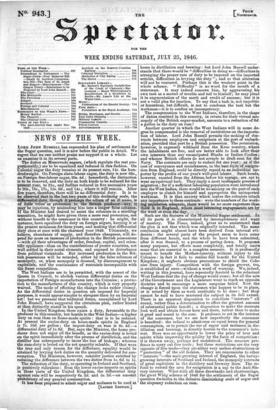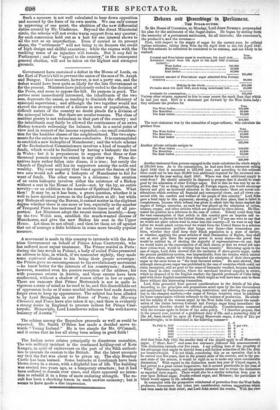NEWS OF THE WEEK.
LORD JOHN' RUSSELL has expounded his plan of settlement for the Sugar question, and it is now before the public in detail. We regret that we can neither praise norsupport it as a whole. Let us examine it in its several parts. The duties on Muscovado sugars' (which regulate the rest pro- portionably,) are to be equalized and reduced in this fashion. On Colonial sugar the duty remains at its present rate, 14s. the hun- dredweight. On Foreign slave-labour sugar, the duty is now 63s., on Foreign free-labour sugar, 2$,s. 44.: henceforth, the distinction is to be removed, and the duty on both kinds to be reduced for the present year, to 21s., and further reduced in five successive years to 20s., 188., 17s., los. 04., and 14s.; where it will remain. After five years, therefore, there will be no differential duty. It is to be observed that in the last two years of this declining scale, the differential duty, though it prolongs the odium of an ill name, is of little value as protection to the British producer—nay, it may be injurious_, by misleading him into a longer false ieliance. If the Minister had desired to assist the colonists in a startling transition, he might have given them a more real protection, not without benefit to the consumer in this country : he might, for instance, have equalized the duty on foreign sugars, keeping it at the present minimum for three years, and making that differential duty close at once with the charmed year 1849. Ultimately, we believe, abundance of supply, and therefore cheapness, will de- pea' far more on increase of production in the British possessions —with all their advantages of order, freedom, capital, and scien- tific appliance—than on the contributions of poorer countries, not well settled in their social elements, and exposed to disturbance from political vicissitude. But increased production in the Bri- tish possessions will be retarded, either by the false reliances of monopoly' or, when monopoly is doomed, by discouragement to capitalists, and the continuance of restraints incompatible with the freest competition. The West Indians are to be permitted, with the assent of the Queen in Council, to abolish various differential duties on the importation of Foreign manufactures into the Colonies ; a protec- tion to the manufactures of this country, which is very properly waived. The mode of effecting the change looks rather clumsy. As the differential duties in question are imposed for Imperial purposes, it would appear simpler to abrogate them by an Imperial act : but we presume that technical forms, unexplained by Lord John Russell, have suggested the circuitous plan, rather hinted at than distinctly- stated in his speech. In the United Kingdom there exists a duty, favourable to the producer in this country, but hostile to the West Indian—a higher duty on rum than on home-made spirits : that is to be reduced. At present the excise-duty on home-made spirits in England is 7s. 104. per gallon • the import-duty -, on rum is 9s. 44.—a differential duty of Is. 6d. But, says the Minister, the home pro- ducer does not enjoy all the benefit, as the excise-duty is levied en the spirit immediately after the process of distillation, and the distiller has subsequently to incur the loss of leakage ; whereas the rum-duty is levied on the net quantity saleable. If that were the tame and only reason for the difference, equality would be attained by levying both duties on the quantity j delivered for con- sumption. The Ministers, however, consider justice satisfied by reducing the difference between the two chides from is. 64. to Is.
The reduction of the duty, as operating in Ireland and Scotland, is positively ridiculous : from the lower excise-imposts on spirits in those parts of the United Kingdom, the differential duty against rum will be respectively 6s. 24. and Us. 24.—an amofint prohibitory of any general consumption. It has been proposed to admit sugar and molasses to be used at [LATEST EDITION.] home in distillation and brewing : but Lord John Russell under- stands that there would. be "difficulties in doing so—difficulties in arranging the proper rate of duty to be imposed on the imported articles, difficulties in levying the duty "; and so that alteration will not be ventured. Perhaps this is the weakest point in the whole scheme. " Difficulty ' is no word for the mouth of a statesman. It may indeed concern him, by aggravating his own task as a matter of trouble and toil to himself; he may plead it in augmentation of the merit and credit of success; but it is not a valid plea for inaction. To say that a task is, not impolitic or hazardous, but difficult, is not to condemn the task but the workman—it is to confess an incompetency.
The compensation to the West Indians, therefore1 in the shape of duties remitted in this country, in return for their virtual mo- nopoly of the British sugar-market, amounts to a reduction of 6d: a gallon in the duty, on rum Another quarter in which the West Indians will in some de- gree be compensated is the removal of restrictions on the importa- tion of labour. Lord John Russell permits the making of clin- tracts between employers and emigrants at the port of embark- ation, provided that port be a British possession. The permission, however, is expressly withheld from the Kroo country, where the inhabitants are free, and are better able, to look after their own interests than any emancipated Blacks or Indian Coolies ; and whence British officers do not scruple to draft men for the Navy. The contracts are only to endure for one year.; as if the cost of conveyance and maintenance, in the,best stylejof.emigra- tion from England, could be directly repaiitta an individual im- porter by the profits of one year's well-paid lalmnr.. Such bonds, however, exacted from the African before his voyage,, are apt to wear an equivocal look. They imply, a most inadequate process of migration ; for if a sufficient labouring population were introduced into the West Indies' there would be no anxiety on the part of each employer to clutch for himself and appropriate the unimported workman. It is that anxiety which makes the colonists attach any importance to these contracts : were the numbers of the work- ing population adequate, there would be no more eagerness than there is in England, where most labouring engagements are by the week or even the day.
Such are the features of the Ministerial Sugar settlement. In all its parts it is characterized by incompleteness and want of mastery. The Times, indeed, Fives us to understand that the plan is not that which was originally intended. The same conclusion might almost have been derived from internal evi- dences: the several parts of the project seem to have come from different hands, and the whole to have been submitted, after it was framed, to a process of paring down. It proposes many purposes, but effects none completely, and totally omits some that are essential to a complete measure. It is professedly meant to benefit the Mother-country, without injury to the Colonies : in fact it fails to realize full benefit for the United Kingdom ; it neglects obvious precautions to shield the Colo- nies from injury. Competition with the foreign grower, too, is established at once—without a word of warning. We, indeed, writing in this journal, have repeatedly foretold to the reluctant West Indians that the day of change would come ; but all the acts of the Government and the Legislature went to teach an opposite doctrine and to encourage a more sanguine belief. Now the change is forced upon the statesmen who happen to be in place, or is seized by them as work creditable to be done : but they cannot be said to have mastered the subject in its full extent. There is an apparent disposition to conciliate "interests" all round, rather than a determination to effect the greatest amount Of substantial public benefit ; a disposition to make the measure look well and obtain favour here and there, rather than to make it good and sound to the core. It professes to act in the interest of the consumer, but we see how imperfectly the consumer is benefited : the refusal to admit rum on equal terms for general ' consumption or to permit the use of sugar and molasses in dis- tillation and brewing, is directly hostile to the consumer's inte- rest. Here was an opportunity to lower the price of beer and spirits while improving the quality by the force of competition : it is thrown away, perhaps not understood. The measure pro- fesses to carry out free trade ; but these restrictions are the very opposite of free trade—they are either very useless obstructions or " protection " of the old fashion. They are concessions to other interests "—the malt-growing interest of England, the barley- growing interests of Scotland and Ireland, the monopoly interests of great capitalists in the distillery and brewery lines. The re- fusal to extend the area for emigration is a sop to the Anti-Sla- very interest. What with all these drawbacks and shortcomings, the great Whig scheme of 1846 for the settlement. of the Sugar question dwindles to the delusive diminishing scale of sugar and the sixpenny reduction on rum.
Such a measure is not well calculated to bear down opposition and succeed by the force of its own merits. We can only concur in approving of one point, the abolition of the new differential duties created by Mr. Gladstone. Beyond the direct Ministerial circle, the scheme will not evoke warm support from any quarter; for each concession held out as a bait for one interest shows to all the rest as an imperfection. Even if carried in its present shape, the " settlement " will not bring to its framers the credit of high design and skilful execution ; while the stigma with the rankling sense of an injustice will remain. But it may fail in Parliament ; and the "appeal to the country," in the consequent general election, will not be taken on the highest and strongest grounds.



























